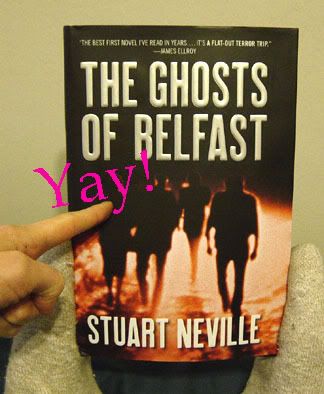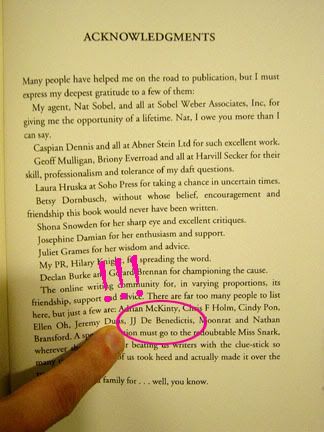This past weekend, I attended
The Surrey International Writers Conference, which is one of the best conferences in North America for improving your writing skills and learning about the publishing industry. The conference is extremely well-run, focuses on craft, and includes (free) a ten-minute agent/editor pitch and a ten-minute author/editor "Blue Pencil" clinic.
I'm going to summarize the useful information from my workshop notes here on the blog, but I'm going to have to break it up over several weeks' worth of Meaty Mondays, because there's LOTS to cover.
These summaries will be in point form, because my notes aren't much more than that, plus doodles.
This week:
Panel Discussion: Genre FictionI use the following abbreviations to identify speakers:VD = Verna Dreisbach, literary agent, moderator
DM = Donald Maass, literary agent and writer
MK = Meredith Koffel, literary agent
BM = Bob Mayer, writer
KS = Kristin Sevick, editor
Topic: What's important in genre fiction?
DM:
- characters we care about
- problems that are big and urgent
- you need to delve deeper into characters to make conflicts and problems more gripping
- the story must resonate with readers
IMPORTANT:
- it's NOT having a new gimmick or twist that makes books break out: it's having deeper character development. Twilight is a perfect example of this. The idea is not new; the depth of the character development is
MK:
(speaking with regard to YA in particular)
- agrees with DM it's the character rather than the plot that compels
- does want the addictive quality in the plot too, however
- the character is often an idealized version of ourselves
KS:
- don't chase trends; write what you're passionate about, because the passion is what readers respond to
BM:
- he doesn't want to write what he knows; he wants to write what he loves and reads
- agrees with KS that passion is what's valuable
- Notes that emotion is more important to success as a writer than business acumen is; reiterates that chasing trends is not going to work out
- says new writers too-often fail to consider what they want to write in the long-term until after a publishing contract has locked them into a particular genre
Topic: Cliches
VD:
- read the genre you write so you recognize cliches
DM:
- things like the cloning of Jesus or genetically modified doomsday viruses are cliches, but they have been done well (very rarely)
- the technique the successful authors used was to, step-by-step, make the impossible seem real by showing how each of the reader's arguments could have a loophole. They skilfully guide the reader through a conversion from scepticism to suspension of disbelief
MK:
- do research on your genre to avoid cliches
- anticipate the reader's objections to something outlandish (like Jesus cloning)
- make sure it's your characters and story that are selling the novel, not a gimmick or a topic that's currently in the news
Topic: Switching genres
KS:
- switching genres makes your publisher nervous because you are almost starting from scratch. There is no guarantee you can find a new audience and you risk alienating or losing your old audience (due to no new books of the sort they want coming out)
BM:
- you must break out in one genre before you can switch to another
- every plot has been done, but NOT every character has been done. This is why you want to make your characters compelling. They're what makes your story unique.
- Theme can also be what sets your book apart. The emotions provoked by the book's theme will stick with the reader long after the book is closed.
Question from the audience: What do we need to know about women's fiction?
KS:
- your main character should either be strong or show a growing strength
DM:
- a strong character acts, she doesn't just react
- he notes many authors try to create reader empathy for the protagonist by showing her in the grip of misery due to some tragedy, like the death of a child. He called these "women's disaster novels"
- pain is not enough to establish reader empathy; plant a clue early on to show there is something redeemable about this character--some spark still in her. If she appears simply miserable, the reader will not want to read on.
- the character should be likeable to both writer and reader
- question to ask yourself: How can I portray, in the first few pages, what I like about my character?
MK:
- inject some hope and inspiration into the scene
- she should be relatable despite her misery
Question from the audience: Are there out-dated themes?
BM:
- No. Themes are universal and timeless. People are people.
DM:
- Styles get outdated, however
Topic: Do agents/editors work with writers who have fire and a good idea, but whose writing isn't quite there yet?
MK:
- usually no, unless very excited
- would only offer editorial suggestions and invite a re-query
- agents are doing more of that sort of editing these days
DM:
- there are very good independent editors out there, and there are crooks
- be a very smart consumer
- that said, the right person can be incredibly helpful (JJ's Note: DM's wife is an independent editor, and she gave a very good workshop right after this one)
- from someone you think to hire, ask for samples of work, timelines on when to expect them to get back to you, and run away from people who make false promises about what they can do for your career. There are no guarantees an editor can get you to publication
INTERESTING:
- he says over the past 10 years, agents have been doing more editing than some editors do. However, in the past year or two, the trend has begun to swing back the other way (JJ's Note: I didn't quite understand what market forces were driving this)
KS:
- 1st time authors are a gamble because they, perhaps, can't take editorial direction
- thus, 1st time authors have to have a book that is almost perfect, as is
- on 2nd and 3rd books, editors often do more work on a novel because they know whether the author is easy to work with by that point
- if a 1st time author is close, but not quite, KS kicks the issue back to the agent and invites a requery, i.e. if the writer can't take direction, it's now the agent's problem.
VD:
- the "almost there" books are the hardest ones to say no to, but agents must due to time constraints
KS:
- if the voice is there, that's more persuasive; editing is about fixing plot and characters. However, you can't fix voice if the writer doesn't have a grip on that yet
BM:
- accepting editorial direction is a key skill if you want to be a successful writer. Of the people BM has done workshops with, he estimates 95% of them WON'T change their manuscripts. He makes suggestions, but they merely rearrange the same errors and don't fix the problem.
- BM jokingly outlines the 5 stages of accepting editorial direction:
--- Denial: "Nothing's wrong with my book. The editor is crazy."
--- Anger: "Correction. The editor is crazy and
evil."
--- Bargaining: "Okay, maybe some things could be better. But only small things."
--- Depression: "My book sucks. I suck. Life sucks."
--- Acceptance: "Okay, then. I am going to rewrite it until it doesn't suck."
DM:
- the problem with "almost there" stories is usually that the writer has not taken the story deep enough or far enough
- the stakes have to be higher
- dig deeper, emotionally
MK:
- concept editing is what agents do, i.e. how and what to change, rather than line edits
Topic: DM asks KS if she sees the following trend--does the 2nd book in a series tend to be a less brave novel than the first was?
KS:
- sometimes
VD:
- the author has less time to write their 2nd book; 8 months instead of an arbitrary number of years
BM:
- no author training exists; we authors need to figure out our long-term plan, and we usually haven't when the first contract comes in
- the panic caused by getting signed causes writers to react rather than to act, and that generates weaker, less well-thought-out books
DM:
- writers need tools for developing novels. (JJ's Note: I think he means a mental roadmap for assembling a plot, rather than pure instinct and muddling) Writers who turn out a lot of novels have these.
BM:
- Author dissection: choose some authors who have careers like you would like to have. Study how they conduct their career and model your career on theirs.
VD:
- writers need to study the business and learn all aspects of it
Question from JJdeGoblin: Where's the line between "fresh and original" and "crazy and inaccessible"? (JJ's Note: I got some laughs from the panel by asking that. Nice feeling!)
MK:
- good enough writing can overcome resistance to any idea
DM:
- an audience does exist for wild ideas, but it might turn out to be a small audience
- you cross the line only when no one at all wants to read your book
INTERESTING EXAMPLE:
- DM represented a novel featuring schizophrenic and clinically depressed characters in an oppressive environment. It didn't sell well in North America, but sold extremely well in Eastern Europe. Apparently gloom and madness really resonate with, for example, Bulgarians.
Question from the audience: Must a book fit into a well-defined genre?
Judine (Terry Brooks' wife):- speaking as a former bookseller, genre is for marketing purposes only. It's for fitting books onto shelves
VD:
- write the story in you; worry about shelving later
DM:
- when you sell enough copies, genre becomes irrelevant
MK:
- "kitchen sink" novels usually have one thread that works better than the others
KS:
- agrees with MK that one thread will be strongest, and that can be used to pigeon-hole the novel
- notes the publisher has to pick one bookseller only from e.g. Barnes and Noble, so they need to know what genre to call the book
- that said, you can let your agent and editor figure it out
DM:
- in the industry, we use "comp" titles. Authors seem afraid to mention comp titles (JJ's Note: "comp" titles are "comparative" titles--books similar to yours. See
Eric's explanation on 'Pimp My Novel' for more details.)
- agents would find this helpful
- even inaccurate comp titles are useful because they give the agent something to react against
KS:
- but the comp title needs to be accurate
BM:
- authors don't necessarily know good comp titles, especially new authors
DM:
- Pet peeve: know your genre, i.e. read it extensively
BM:
- but new writers don't know
- example: published writers get more from BM's workshops on the pitfalls of starting writing than new writers do. He gets comments from the former saying, "Wish I had known that before..."
Topic: Learning
DM:
- 1st novels are often too safe, because the writer is trying to break into publishing. Then, the writers often don't improve
- great writers keep trying to improve, keep going to workshops (gives an example of a best-selling author he saw in the back of a seminar room scribbling notes as ardently as the 150 unpublished writers in there with her.)
VD:
- teaching helps writers improve too
DM:
- teaching has helped my writing immensely
Terry Brooks (bestselling author of the Shannara series):
- You're learning at every point of your career. You never know it all.
DM:
- it's like yoga
BM:
- teaching helps my writing too
- learn from anyone; get a range of experiences; listen to people you don't agree with
- sometimes you realize you were wrong
- exchange of ideas: the teacher learns as much from the students as vice versa
(JJ's Note: this applies to giving critiques; it's a form of teaching.)
Panelists sum up:KS:
- you must practise writing; it's a skill. You need to study and practise.
- it's a life-long process
- also, be a professional. Treat your writing as you would any aspect of your day job.
BM:
- be open to learning. That's the biggest difference between those who will succeed and those who won't.
DM:
- pet peeve: promotion won't make you a success.
- throwing money at your book won't make it succeed. The only thing that makes a book succeed is the quality of the story in it
MK:
- authors do need to promote their own books
- think about branding when you create your Facebook, Twitter, etc.
VD:
- read philosophy. Read theology. Read Aristotle. Understand people.
End of Panel discussion
~~~~~~~
Bonus: The Story of D'oh.
Thursday night, I (JJ) was obsessing over having all the information I needed printed out, plus five-page samples, cover letters, business cards, partials, and whatever else I might need
just in case.
Y'know. Just in case some editors spontaneously leap on me and cling like groupies, only to be scraped off with sample pages.
Thus, I arrived Friday morning with a sizeable brick of dead tree in my backpack.
And it was only when I sat down in my first workshop that I realized, despite all the paper I was hauling, I had forgotten to bring any paper to
write on.
So now I'm scribbling notes on the back of one of my partials. If I meet any predatory editors, I'm hooped.
~~~~~~~








